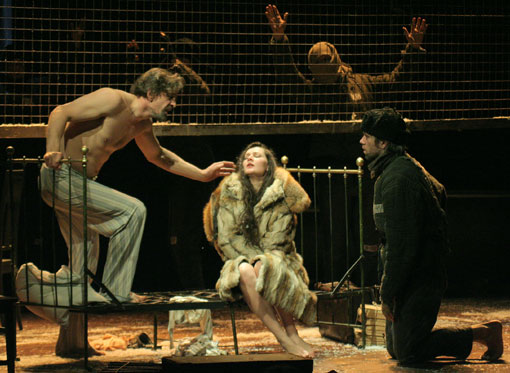





CREDITS
PRESS
TOUR INFO
Reggio Emilia, Italy
Teatro Municipale Valli
5-6 November 2011
A prominent scientist, an academic physicist, who has finally approached the secret of creating an atomic bomb, returns to Moscow from evacuation. He is Jewish, and in this respect he hasbeen decidedly unlucky. Though the Holocaust is supposed to be happening on the other side of the front, nationalism and anti-Semitism are becoming the unspoken policy of Stalin�s system. Jewish mentality, Jewish art, Jewish physics � these terms emerge in Soviet academic, cultural and political spheres. The physicist is ostracised, thrown out of his Institute and is facing a terrible dilemma: to stay faithful to the truth, to science, to himself and perish; or to repent and confess non-existing sins and non-existing mistakes. He fully understands the consequences of the first choice. Too many of his relatives are now in Stalin�s concentration camps. In these terrible times a man is easily turned into concentration camp dirt.
A historical coincidence will save the academic. The Soviet State needs the atomic bomb and Stalin is aware of it. Stalin�s personal phone call to this outcast scientist becomes the miracle that will return life, hope, success and recognition to him and his family. The scientist is elated � he once more believes in the system and in the logic of the Soviet State being right. He is ready to forget all his relatives, friends and colleagues who are gone.
Life goes on. And very soon the physicist, Shtrum, will again face a dilemma. It so happens that to be true to oneself when acclaimed, recognised and miraculously saved is much harder than when you are a despised outcast. He is not alone. He is surrounded by a world of his near and dear � people he loves, on whom he cheats, and who love each other. At the front, in evacuation, in the capital of the country waging war, or in the terrible torture rooms of Lubianka, life does not stop. In the ghettos, German concentration camp, and in one of the endless camps of Stalin�s Gulag, people continue to live, make love and suffer. Everywhere they are trying to understand how this could have happened, how this horror could have happened to them.
God grants life but man shapes his own fate. Grossman�s Life and Fate is in fact a simple family story, and it presents us with a vast panorama of the events and problems of the 20th and 21st centuries. In our everyday lives we still encounter the modern guises of fascism, communism, nationalism, totalitarianism, extremism, cruelty and lack of freedom. In spite of everything, people still continue to live, love and hope.
Over the past few years the young students and actors of the Maly Drama Theatre school have been researching the history of their own country and of the world. They have been studying Grossman�sgreat novel, meeting people who were young in the 1930s and �40s and visiting and rehearsing in the territory of Osvenzen and several of Stalin�s concentration camps in the Gulag. Thus, they are learning their profession and trying to understand their own humanity. This is how Brothers and Sisters, Gaudeamus and Claustrophobia were created, and how the new generation of Russian artists is being born.
Once again we are facing the world and ourselves with the most difficult questions. We believe that the emotion, passion, movement dance, music and singing found in theatre can make people hear, feel and understand the most profound things.
Lev Dodin
credits
Vasily Grossman
LIFE AND FATE
A play written and staged by Lev Dodin
Set designer: Alexey Poray-Koshits
Costumes designed by Irina Tsvetkova
Lighting designer: Gleb Filshtinsky
Directed by Valery Galendeev
Music coordinators: Mikhail Alexandrov, Evgeny Davydov
Coaches: Yury Vasilkov, Oleg Dmitriev, Natalia Kolotova, Vladimir Seleznev, Yury Khamutansky
Head of the Staging Department: Vladimir Gladchenko
Sets assembled under the supervision of Evgeny Nikiforov
Light: Vitaly Skorodumov, Ekaterina Dorofeeva, Maxim Romashin
Sound: Yury Vavilov, Lubov Firsova
Costumes: Maria Fomina, Galina Ivanova
Props: Svetlana Tretyakova, Alla Onatjeva
Make-up: Galina Varukhina, Alla Nudel
Performance managed by assistant director Natalia Sollogub
LIFE AND FATE
A play written and staged by Lev Dodin
Set designer: Alexey Poray-Koshits
Costumes designed by Irina Tsvetkova
Lighting designer: Gleb Filshtinsky
Directed by Valery Galendeev
Music coordinators: Mikhail Alexandrov, Evgeny Davydov
Coaches: Yury Vasilkov, Oleg Dmitriev, Natalia Kolotova, Vladimir Seleznev, Yury Khamutansky
Head of the Staging Department: Vladimir Gladchenko
Sets assembled under the supervision of Evgeny Nikiforov
Light: Vitaly Skorodumov, Ekaterina Dorofeeva, Maxim Romashin
Sound: Yury Vavilov, Lubov Firsova
Costumes: Maria Fomina, Galina Ivanova
Props: Svetlana Tretyakova, Alla Onatjeva
Make-up: Galina Varukhina, Alla Nudel
Performance managed by assistant director Natalia Sollogub